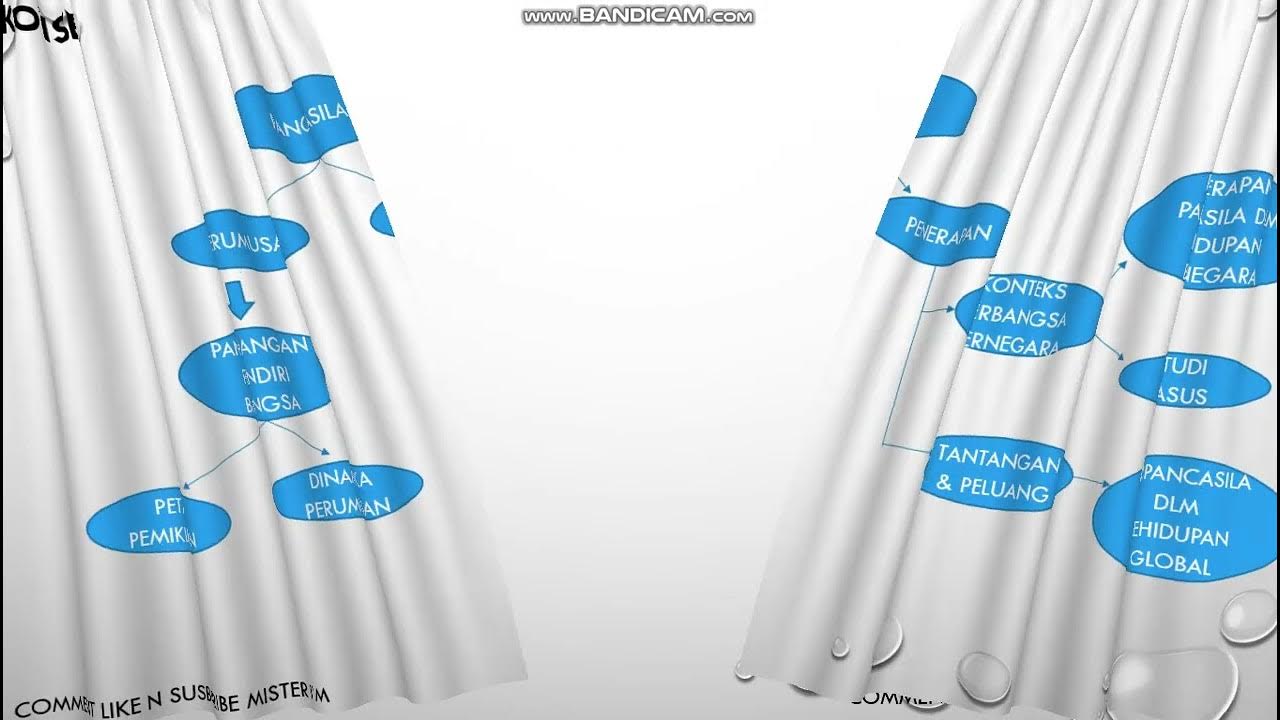Tinjauan Historis Pancasila bag-1
Summary
TLDRThis lecture explores the historical and philosophical roots of Pancasila, Indonesia's foundational state philosophy. It examines the ideological synthesis pursued by Indonesian leaders and students, both domestically and abroad, during the early 20th century. The discussion highlights key figures, including Soekarno, and their contributions to merging diverse ideologies such as nationalism, Islamism, and Marxism into a unified national identity. The narrative also traces the development of Pancasila through pivotal moments, such as the BPUPKI meetings, emphasizing its significance as a guide for modern Indonesian society.
Takeaways
- 📜 The script discusses the historical and modern construction of Indonesia's identity, emphasizing the bravery and creativity of its leaders in breaking through formalities.
- 🏛️ It highlights the importance of Pancasila, the philosophical foundation of the Indonesian state, and its role in shaping the nation's character and direction.
- 🌟 The concept of Pancasila was developed by the nation's founders and is rooted in the context of Indonesian history, requiring continuous maintenance and actualization.
- 🎓 The script mentions the 'Rintisan Yoga San', an activity aimed at finding a synthesis between ideologies, which is a significant part of the historical review of Pancasila.
- 📚 It outlines the historical activities of overseas students, such as those in Cairo and Bandung, who were obsessed with national ideas and contributed to the synthesis of ideologies.
- 🔍 The script emphasizes the 'Sumpah Pemuda' (Youth Oath) as a monument of the synthesis of ideas, focusing on unity and the rejection of ethno-religious boundaries.
- 🌐 It discusses the horizontal and vertical exchange of ideas between ideologies and generations, which does not only create contrasts but also syntheses, leading to a diverse yet unified Indonesian identity.
- 🏛️ The script describes the establishment of BPUPKI (Preparatory Committee for Indonesian Independence) and its role in defining the philosophical foundation of the Indonesian state.
- 🗣️ It details the contributions of various figures, such as Soekarno and Hatta, in the formulation of Pancasila, reflecting a consensus on the values of belief in one God, humanity, unity, democracy, and social justice.
- 📝 The script concludes by encouraging students to learn from history and continue the legacy of synthesizing diverse ideas into a cohesive national identity.
Q & A
What is the significance of the young generation's modern thinking in the construction of Indonesia's independence?
-The young generation's modern thinking was significant in breaking formalities and setting an example for current generations, showcasing the courage and creativity of the leaders in the construction of Indonesia's independence.
What is the importance of Pancasila in the context of Indonesian history and education?
-Pancasila is the philosophical foundation of the Indonesian state, and its education is crucial for maintaining its character and direction as the guiding principles for the nation.
What does the term 'Rintisan Yoga San' refer to in the context of the script?
-Rintisan Yoga San refers to the activity of seeking a synthesis between ideologies, which was a precursor to the formulation of Pancasila and the ideological foundation of Indonesia.
How did the Perhimpunan Indonesia contribute to the ideological synthesis before Indonesia's independence?
-The Perhimpunan Indonesia formulated its political ideology based on four principles: unity, non-cooperation, self-reliance, and solidarity, which were a synthesis of various political ideologies from different movements before it.
What role did Tan Malaka play in the development of Indonesian political thought?
-Tan Malaka emphasized the strong roots of the concept of people's sovereignty or democracy in the traditions of the Nusantara community, contributing to the synthesis of political thought in Indonesia.
How did Soekarno contribute to the synthesis of ideologies in the construction of Indonesian nationalism and independence?
-Soekarno constructed a synthesis of nationalism, Islamism, and Marxism in the framework of national and independence construction, leading to the formulation of socio-ideology and socio-democracy.
What is the historical significance of the Sumpah Pemuda (Youth Oath)?
-The Sumpah Pemuda is a monument of the synthesis of ideas, emphasizing the unity of the nation and the use of the Indonesian language, and it represents the breaking of ethno-religious boundaries and the establishment of civic nationalism.
What was the role of BPUPKI (Badan Penyelidik Usaha Persiapan Kemerdekaan Indonesia) in the preparation for Indonesia's independence?
-BPUPKI was initially tasked with researching and preparing for independence but eventually played a crucial role in formulating the philosophical foundation of the state and the Pancasila.
How did the Japanese occupation influence the process of Indonesia's independence?
-The Japanese occupation initially planned a two-step process for Indonesian independence, but the bravery and creativity of Indonesian leaders led to the establishment of BPUPKI and the formulation of Pancasila as the state's philosophical foundation.
What were the key values discussed during the BPUPKI sessions that aligned with the Pancasila principles?
-The key values discussed included belief in one supreme God, humanity, unity, democracy through deliberation, and social justice and prosperity, which are all reflected in the Pancasila.
How does the script emphasize the importance of ideological exchange and synthesis in the formation of Indonesian identity?
-The script highlights the importance of horizontal and vertical exchange of ideas across ideologies and generations, leading to a synthesis that shapes the inclusive and diverse character of Indonesian identity.
Outlines

هذا القسم متوفر فقط للمشتركين. يرجى الترقية للوصول إلى هذه الميزة.
قم بالترقية الآنMindmap

هذا القسم متوفر فقط للمشتركين. يرجى الترقية للوصول إلى هذه الميزة.
قم بالترقية الآنKeywords

هذا القسم متوفر فقط للمشتركين. يرجى الترقية للوصول إلى هذه الميزة.
قم بالترقية الآنHighlights

هذا القسم متوفر فقط للمشتركين. يرجى الترقية للوصول إلى هذه الميزة.
قم بالترقية الآنTranscripts

هذا القسم متوفر فقط للمشتركين. يرجى الترقية للوصول إلى هذه الميزة.
قم بالترقية الآنتصفح المزيد من مقاطع الفيديو ذات الصلة
5.0 / 5 (0 votes)






